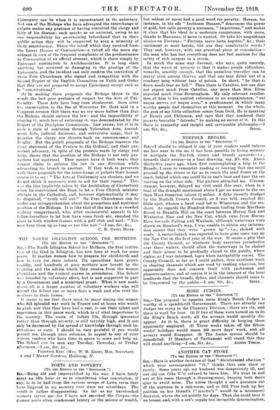POETS AND POVERTY.
[To THE EDITOR OF THE " SPECTATOR.") Ins,—Being old and impoverished by the war, I have lately spent an idle hour or so in considering what consolation, if any, is to be had from the various scraps of Latin verse that have lingered in my memory ever since my schooldays. The result is rather disappointing. As far as my unrefreshed memory serves me—for I have not searched the Corpus—the Roman poets often condemned luxury or the misuse of wealth,
but seldom or never had a good word for poverty. Horace, for instance, in his ode " Inclusam Danaen," denounces the power of gold, but calls poverty a nuisance, " importune," and makes it clear that his ideal is a moderate competence, with more, thanks to Maecenas, if more is wanted. Or take his magnificent alcaics on Fortune : " Fortuna saevo laeta negotio," &c.; their sentiment is most heroic, but are they comfortable words P They end, however, with one practical piece of consolation— the man who has lost everything does not feel anxious for the safety of rich cargoes in a storm.
In much the same way Juvenal, who says, quite untruly, that the worst of poverty is that it makes people ridiculous, remarks, sensibly enough, that the penniless traveller can be merry even among thieves, and that one may drink out of a crockery mug without fear of poison. In short, " he that is down needs fear no fall." Then there is Catullus, but one does not expect much from Catullus, any more than Mrs. Elton expected much from Birmingham. My only relevant recollection of him is his unkind reference to an acquaintance, " cui neque servos est neque area," a predicament in which many worthy people find themselves at this moment. On the whole, the gem of my little collection comes from Ovid. He is speaking of Baucis and Philemon, and says that they rendered their poverty bearable " fatendo," by making no secret of it. In this there is sympathy and insight and serviceable philosophy.—I
am, Sir, &c., SENEX.






































 Previous page
Previous page